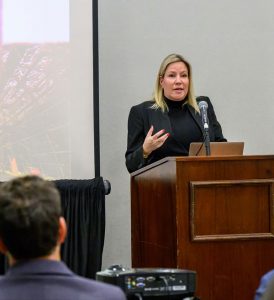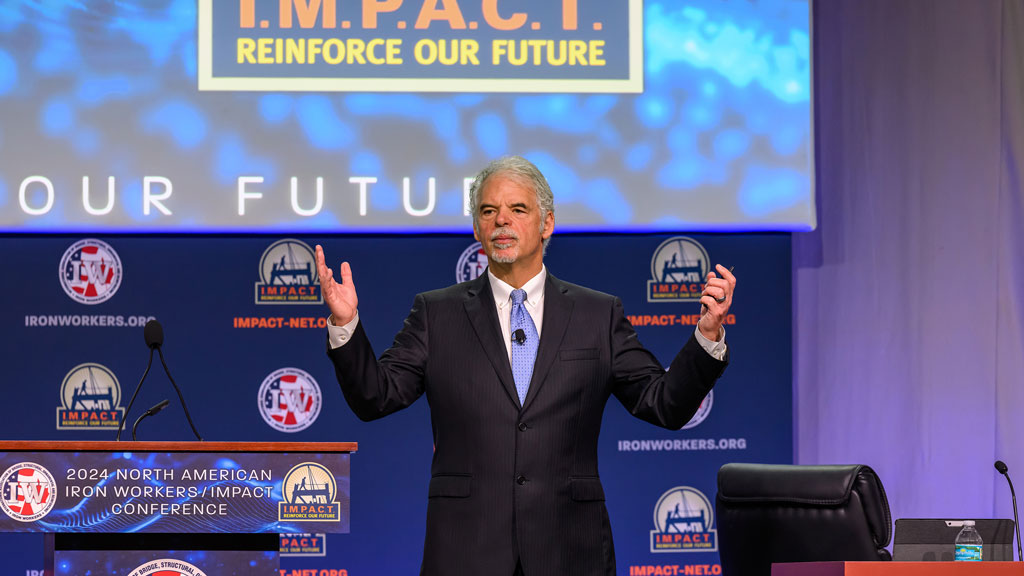In a hard hitting and far reaching speech, a construction motivational speaker told more than 1,000 owners, managers, contractors, union workers and other iron industry representatives they need to look to the future and not be held back by outdated attitudes and thinking.
“How many people have heard the ‘back in my day’ talk? How many have given it?” asked Mark Breslin, the keynote speaker at the recent Shape Your Future conference in Orlando, Fla.
It was organized and sponsored by the Iron Workers which represents 130,000 ironworkers in North America, and the Ironworker Management Progressive Action Cooperative Trust (IMPACT).
Breslin used those clichés to highlight the challenges facing contractors and the union. They include an aging workforce, the entry of minorities and women into the industry, different value systems of today’s workers compared to previous generations who may have simply been satisfied with a paycheque, and lack of worker engagement.
Only 30 per cent of the North Americans describe themselves as fully engaged in work, said Breslin, referencing a Gallup Poll taken before the outbreak of COVID-19.
It’s not good enough for contractors to solely focus on what they pay workers. Instead, they should be emphasizing the opportunities for advancement and their workplace culture, he said.
“Talent flows where it’s valued most. And what do you think that value looks like? My company, my union cares for me.”
Breslin condemned workplace environments where women and minorities are disparaged, apprentices or new employees are derided for making recommendations on how to save money or time, and where there is a general lack of respect.
“How many people have had tools thrown at them? How stupid is that?”
A fourth-generation member of a construction family, a former CEO of a large heavy civil contractors’ association and an author, Breslin used his experiences as a public speaker to highlight the path the industry has to take.
Even though he has made over 2,000 speeches to audiences, Breslin said he still gets “petrified” every time he has to make a speech.
“But you have to embrace your discomfort.”
At the same time, he also said the Iron Workers can take pride in what it has achieved in “people first culture changes.”
“We led the way,” said Breslin, citing the Iron Workers promotion of union contractor partnerships, the entry of women into the industry and the importance of mental health.
And the pressing issue of mental health was a major focus of one of the conference sessions.
Moderated by IMPACT’s Canadian regional director Bert Royer, a four-member panel comprised of the Construction Industry Institute and the University of Colorado’s Construction Safety Research Alliance project representatives highlighted the work of Research Team 401.
This is a joint venture of the two agencies to better understand mental health in the construction industry. Last year the team sent out almost 1,200 questionnaires to union and non-union construction employees asking them to identify the stressors they deal with. Some of the responses include financial, job satisfaction and factors outside of the workplace.

Held over two days the conference was comprised of a mix of main seminars and breakout sessions covering a range of topics, including one specifically targeted to Canadian attendees.
In a Political Challenges and Opportunities in Canada session, Toronto-based Ironworkers consultant Lindsay Maskell drew a spotlight on three main topics: the impact of immigration on construction, the number and availability of construction stimulus grants, and the still-to-be passed Sustainable Jobs Act.
In an interview after the conference, Maskell said it’s important that the industry understand, monitor and support the act because of the jobs and opportunities it can create.
“It (the act)’s not about a carbon tax.”
Maskell was also a participant in another session titled Lobbying for Jobs, State by State, Province by Province. A key consensus that emerged included the importance of maintaining good government relations at all levels in securing federal and state/provincial funding for infrastructure projects.
Some of the conference’s other sessions included cyber security, a steel erectors’ roundtable, artificial intelligence and the continued growth of the metal building market.
Planning is already underway for the 2025 conference which also be held in Orlando from Feb. 23 to 26 says IMPACT’s marketing and public relations director Sara Schuttloffel.



Recent Comments